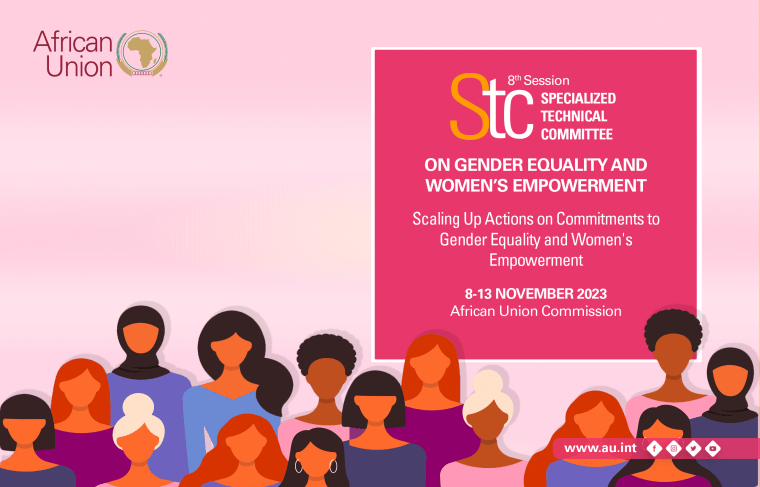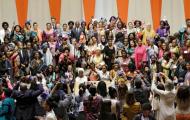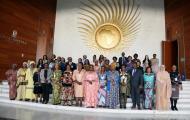8th Specialized Technical Committee on Gender Equality and Women’s Empowerment. “Scaling up actions on commitments to gender equality and women’s empowerment.”
8th Specialized Technical Committee on Gender Equality and Women’s Empowerment. “Scaling up actions on commitments to gender equality and women’s empowerment.”
THE 8TH STC ON GENDER EQUALITY AND WOMEN’S EMPOWERMENT.
The African Union Commission (AUC)’s Women, Gender and Youth Directorate (WGYD) is convening the 8th Specialized Technical Committee on Gender Equality and Women’s Empowerment (STC on GEWE) from the 8th to13th November 2023.
The meeting will be attended by the AU Ministers in charge of Gender and Women’s Affairs and their Experts and will consider the following thematic issues.
- The 2022 Reports of the Solemn Declaration on Gender Equality in Africa (SDGEA)
The Solemn Declaration on Gender Equality in Africa (SDGEA) is divided into six thematic areas of action: Health, Peace and Security, Governance, Human Rights, Education and Women’s Empowerment. The STC will consider the 2022 annual report of the Chairperson of the African Union Commission (on measures taken to implement the principles of gender equality and gender mainstreaming per the articles of the SDGEA.
The SDGEA also enjoins AU Heads of State and Government to report annually on their progress in gender mainstreaming at the Summit.
- High Level Presidential Initiative on Positive Masculinity in Leadership to End Violence Against Women and Girls
The 3rd Men’s Conference on Positive Masculinity will be held from 27 to 28 November 2023 in Johannesburg, South Africa will take stock of the implementation of the outcomes of the first and second Men’s Conferences, i.e. the Kinshasa Declaration and the Dakar Call to Action as well as consider effective strategies to mobilize support for the development, negotiation, adoption and ratification of the AU Convention on Ending Violence Against Women and Girls (EVAWG.
The call for an AU Convention to End Violence Against Women and Girls aims to secure political commitment and amplify renewed state accountability to protect, promote and fulfil women and girls’ rights to be free from violence. The Convention will play a vital role in raising awareness about the prevention and seriousness of violence against women and girls as well as providing a clear legal framework and set of standards for addressing violence against women and girls.
Stakeholder Consultations will precede the 3rd Men’s Conference between October and November to solicit the inputs of African citizens through a comprehensive Advocacy and Media campaign to ensure that their views and concerns are integrated in the outcomes and decisions of the Conference and post-conference implementation and the AU EVAWG Convention. The STC will take note of the outcomes of the 3rd Men’s Conference.
- Draft Regional Action Plan for Africa with a Monitoring and Evaluation Framework on EVAWG
The draft Regional Action Plan (RAP) for Africa with a Monitoring and Evaluation Framework on EVAWG reflects the region’s commitment to step up its efforts to address different forms of VAWG, recognizing its negative impact not only on the lives of women and girls but also for communities and societies at large. The RAP will serve as a regional framework that will guide regional partners and Member States to translate global, regional, and national commitments into strategies and actions to be undertaken at regional and national levels on ending violence against women and girls and in all contexts, whether development or humanitarian contexts.
The RAP is designed based on best practices and lessons learned from the development and implementation of diverse strategies, national action plans and interventions on EVAWG. It is guided by key principles and primary approaches to ending VAWG, and international and regional human rights instruments.
The STC will be required to adopt the RAP.
- AU Women and Youth Financial Mechanisms
The Fund for African Women, that was aligned to the 1st African Women’s Decade on Grassroots Approach to Gender Equality and Women’s Empowerment ended in 2020. However, there is unfinished business related to lack of reporting from beneficiaries for the grants for the AWD themes of 2011 to 2013 as well as backlog of disbursement for the AWD themes between 2014 and 2020. In this regard, the STC will be briefed on the status of the Fund for African Women and the progress on finalizing the disbursement process and bring the business of the FAW to a close.
In regard to aligning the Trust Fund for African Women’s (TFAW), to the Fund for African Women to Agenda 2063 and to accelerate its transformation into a Trust Fund, a study was undertaken to explore modalities of achieving this objective, resulting in the development of a TFAW Strategy, Communications Strategy and a Resource mobilisation Strategy.
The STC will be updated on the status of operationalizing the TFAW as a financial and economic inclusion tool of the 2nd African Women’s Decade towards Gender Equality and Women’s Empowerment.
- Protocol on Women’s Rights 20 years commemorations.
The African Union Commission (AUC), through the Women, Gender and Youth Directorate (WGYD) convened a High-Level Conference to commemorate the 20th Anniversary of the adoption of the Protocol to the African Charter on Human and Peoples' Rights on the Rights of Women in Africa, commonly known as the Maputo Protocol on Women’s Rights. The celebratory conference took place in Nairobi, Kenya on 10 and 11 July 2023. The conference was held under the theme, “Raising the bar on Policies and Partnerships for African people” to highlight the 20-year journey of the Maputo Protocol and how it has positively changed Africa’s Gender Equality and Women Empowerment (GEWE) landscape. Deliberations were conducted in line with the AUC-WGYD framework that looks at ‘Policies, Partnerships and People’ with Promising Practices as a thread that runs across the three Ps, for the advancement of women’s rights in Africa.
The primary objective of the celebrations of the 20th Anniversary of the Maputo Protocol was to take stock of achievements made in Africa in the promotion and protection of women’s human rights over the 20 years since the adoption of the Maputo Protocol, reflect on key challenges and some of the emerging women’s rights concerns and agree on impactful solutions and strategies to accelerate better action and outcomes for the African women’s human rights system.
- Pre- Commission on the Status of Women 2023.
The Commission on the Status of Women (CSW) is the global policy-making body dedicated exclusively to gender equality and advancement of women. Every year, representatives of Member States gather at the United Nations to evaluate progress on gender equality, identify challenges, set global standards, and formulate concrete policies to promote Gender Equality and Women’s Empowerment (GEWE) worldwide. The principal output of the CSW is the Agreed conclusions on priority themes set for each year which contain an assessment of progress, as well as of gaps and challenges.
Since 2012, AU Member States, Regional Economic Communities (RECs), representatives of Civil Society, UN Agencies and other development partners, have convened by AUC, Women, Gender and Youth Directorate in partnership with UN agencies prior to the global CSW negotiations, serving as a platform for carving out a Common African Position on the theme of the year to influence the global Agreed conclusions.
STC will consider the areas of focus from the Africa Pre-Commission on the Status of Women 68 Consultation (CSW68) that carves a Common African Position on the theme of the year to influence the global Agreed conclusions at the upcoming sixty-Eight session of the CSW (CSW68) in March 2024.
- Gender and Youth Statistics
In alignment with WGYD's dedication to informed and equitable policymaking, we recognize the paramount significance of gender and youth statistics. As a testament to this commitment, in collaboration with UN Women ESARO and UNECA, an informative session dedicated on Gender and Youth Statistics will be shared, on the use of evidence for policy advocacy and policy formulation. This will be a great platform to advocate for greater gender production and data use, but will also be an opportunity to share evidence-based policy advocacy tips with the Member States. The aim is to ensure that all African Union’s decision-making processes on gender and youth are evidence-based and finely attuned to the unique needs and challenges confronted by African women and youth, ultimately fostering more equitable and inclusive policies.
Gender and youth statistics form a cornerstone in the realm of data analysis and policy development. They provide crucial insights into the multifaceted dynamics of Africa's largest population, offering valuable perspectives on the distinctive experiences and disparities that exist among both genders within this demographic. These statistics not only serve as the compass for effective gender-responsive and youth-centric policymaking but also function as the prism through which we track progress, pinpoint areas necessitating targeted interventions, and steer the continental agenda toward the realization of gender equality and youth empowerment.
For more information, please contact:
Dr. Jeanne Flora Kayitesi | Programme Officer | Women, Gender and Development Directorate | African Union Commission | E-mail kayitesijf@africa-union.org
Ms. Doreen Apollos | Communication | Directorate of Information and Communication| African Union Commission | E-mail ApollosD@africa-union.org
References
Ressources
Agenda 2063 is Africa’s development blueprint to achieve inclusive and sustainable socio-economic development over a 50-year period.
Supply Chain Management Division Operations Support Services Directorate
Addis Ababa, Ethiopia














